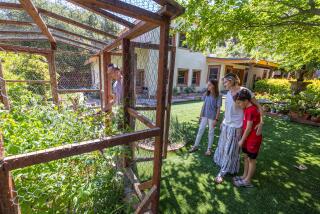A troubled mind in Tucson
- Share via
Reporting from Tucson — On Saturday morning just after 11, the quiet, working-class Tucson neighborhood suddenly filled with sheriff’s patrol cars and FBI agents. They quickly cordoned off the North Soledad Avenue home of Amy and Randy Loughner, who were out shopping.
Moments later, the Loughners, unaware, pulled up with groceries in their old white pickup. They parked across the street from their home.
A neighbor, retired gasoline truck driver Wayne Smith, 70, had seen a TV news report about a shooting at a nearby Safeway store. It said the Loughners’ son, Jared, was the suspect.
Smith approached the couple.
“I said, ‘Guys, I hate to be the one to tell you, but he shot a bunch of people,’ ” Smith said late Monday afternoon in front of the Loughners’ house. Jared’s mother, he said, “just come unglued.”
As authorities searched the house, said Smith, “We stood right out there and cried for an hour. I’m a softie. A man needs compassion. He’s broken up about his son, but also about all those people who died.”
As their son appeared in federal court in Phoenix on Monday, the Loughners remained secluded in their home. Jared Lee Loughner has been charged with murder and attempted murder in the rampage that left six dead and 14 wounded, including Rep. Gabrielle Giffords, who authorities said was his target.
“They’re in there now,” Smith said, just after bringing the couple their mail. “They’re both in there crying. He’s crying and hanging on to me, and she’s not even out of bed. He worshipped the boy.”
It is not clear what the parents knew of their son’s troubles, but it was obvious to his fellow students at Pima Community College in Tucson last spring that something was wrong with Jared Loughner. He often laughed and muttered to himself. When he spoke, he was incoherent or nonsensical. Classmates and professors assumed he was on drugs.
“If you’ve ever seen someone hallucinate, it was kind of like that,” said classmate Lydian Ali, 26. “I never felt threatened by him.” But one woman dropped their poetry class partly because Loughner’s behavior was so weird, Ali added.
Although many who know him said Loughner did not seem violent, others said he scared them. In recent months, the young man’s behavior — both in the classroom and online, where he ranted about the government, U.S. currency and the constitutionality of certain institutions — seemed to be in a downward spiral.
“He had this kind of hysterical laugh. … It was very creepy, very bizarre,” said Pima math professor Ben McGahee, who taught Loughner algebra last summer. “He even came out with some kind of random outbursts or remarks: ‘How can you deny math instead of accepting it?’ ” said McGahee, who said he assumed Loughner was high.
After Loughner scrawled “MAYHEM FEST!!!” across a paper, McGahee alerted a counselor.
Loughner still attended class, and his behavior continued to cause alarm. One of his responses to an algebra test question was “eat+sleep+brush teeth=math.”
The final straw came when Loughner accused his teacher of violating his 1st Amendment rights. McGahee went to see the dean, who pulled Loughner out of class and later told McGahee, “You don’t need to worry about Jared anymore.”
That spring, in the poetry class, Loughner seemed more in control. At one point, he surprised the class when he animatedly performed a poem he had written, thumping his chest and even grabbing his crotch for emphasis. The poem, “Meat Head,” was about a day in his life — waking up hung over, riding the bus to school, feeling lost at the gym:
“Looking around, the cute women are catching my eye/Probably waiting for their hot boyfriends wandering in the locker room/All the men are in shape with new white tank shirts, basketball shorts, and Nike shoes/Confusing look on my face of no idea what to do … “
Still, many of his interactions with poetry classmates were off-putting. One day, a woman read a poem about having an abortion. “He made a really off-color comment,” Ali said. “I remember him saying something about strapping a bomb to the fetus and making a baby bomb out of it.”
Another student, Don Coorough, 58, said Loughner had trouble digesting poems that were sad or emotionally complicated.
“I thought he was an emotional cripple,” Coorough said. Neither Ali nor Coorough said they found Loughner menacing, just odd.
Between last February and September, according to Pima Community College officials, Loughner caused five disturbances on campus that required police response.
On Sept. 29, there was a breaking point when campus police discovered a YouTube video in which Loughner proclaimed the college “unconstitutional.”
(Subsequent Internet statements made by Loughner take issue with U.S. currency not being backed by gold or silver, question whether NASA’s Mars Rover was faked, and charge the government with trying to control citizens with grammar. Those seeking a coherent philosophy will probably be frustrated, said Mark Pitcavage, director of investigative research at the Anti-Defamation League. “So far, most of his beliefs appear to be the product of his own mind, primarily,” he said.)
The night campus police found the YouTube video, officers delivered a letter of suspension to Loughner’s home.
School officials said Loughner would be allowed to return to campus only if a mental health professional certified that he did not present a danger to himself or others.
Five days after Thanksgiving, Loughner uploaded a video to YouTube that said “every Pima Community College class is always a scam!” and “The students are attending a torture facility! You know the teachers are con artists?”
The same day, according to federal authorities, he bought a Glock semiautomatic pistol at a sporting goods store.
A private family
Loughner grew up in a working-class neighborhood, where he and his parents live in a cream-colored, one-story brick home.
Randy Loughner used to lay carpet and surface pools, neighbors said. Amy Loughner is a parks manager and has worked for the Pima County Natural Resources Parks and Recreation Department since 1987.
Their next-door neighbor of 30 years, retired equipment mechanic George Gayan, 82, said Jared is an only child. Jared would walk the family dog, but they did not like to share the details of their lives.
“They’re like a mountain man,” said neighbor Smith. “They want to be alone.”
When Randy Loughner wanted to add on to his house, he sought permission, per the city’s requirement, from Gayan, who consented. Later, when Gayan asked about the project, Randy Loughner rebuffed him.
“He wanted to keep everything private,” Gayan said.
But Jared engaged the neighbors, sometimes to their discomfort. Rachel Evans, 16, recalled seeing Loughner walking in the neighborhood, hunched over, his face obscured by a hooded shirt, mumbling or raising his voice to passersby.
“He was definitely somebody who would make you want to walk forward and not look up,” said Evans, who lives on the same street. “He’d mention government or education, something I didn’t really understand or want to hear.”
He had at least two off-campus legal tangles before his arrest Saturday.
In September 2007, he was cited by the Pima County Sheriff’s Department for possession of drug paraphernalia. Court records show that the case was dismissed by the Pima County Attorney’s Office in November 2007 after Loughner completed a program that included drug counseling.
In October 2008, he was arrested for allegedly tagging a traffic sign in Marana, north of Tucson, with his moniker — including the letters C and X, which he told police stood for “Christian.”
He was released with a citation. He entered a diversion program and paid $500 restitution to the city.
Schoolmates from Tortolita Middle School and Mountain View High School described Loughner as a typical teenage boy — albeit with some nihilistic tendencies — who was trying to find his niche in life.
In high school, friends said, he played in a punk garage band. He also played saxophone in the school band. He loved the bands Rancid and the Misfits and the philosophers Jean-Jacques Rousseau and Immanuel Kant. He went to parties and was a fan of University of Arizona football.
Krysta Bunch, 21, said their high school crowd was a “random group of people.” She remembered his punk band performing in front of a mosh pit during a homecoming celebration their sophomore year.
“He seemed like he was the quiet type; he didn’t like politics at all,” Bunch said.
Lela Chavis, 22, described Loughner as considerate, someone who filled her in on schoolwork if she got sick. Recently, she said, he changed his appearance, opting to cut his curly brown hair and dress more “mature.”
“I would say obviously in the past couple months something had changed about him,” she said. “In a sense, he was growing up. At least that’s what I thought.”
molly.hennessy-fiske@latimes.com
Times staff writers Seema Mehta and Nicole Santa Cruz in Tucson, Kim Murphy in Seattle, and Maeve Reston, Robin Abcarian, Rong-Gong Lin II and Rick Rojas in Los Angeles contributed to this report.
More to Read
Sign up for Essential California
The most important California stories and recommendations in your inbox every morning.
You may occasionally receive promotional content from the Los Angeles Times.














